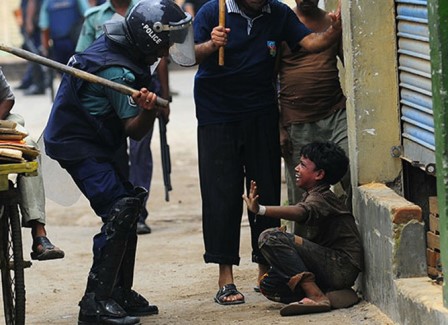
News:
On November 25, 2013, the Chief Election Commissioner (CEC) in Bangladesh announced the schedule for the 10th parliamentary elections, setting January 5, 2014 as the polling day. Immediately after the announcement of the schedule, BNP-led opposition declared a 48-hour countrywide road-rail-waterway blockade in protest, which was later extended to 71 hours. BNP wants the next general election to be held under a non-party government but Prime Minister Sheikh Hasina has already formed an election-time cabinet which includes only her ruling alliance partners. Ruling Awami League says that nothing in the world can stop the scheduled election while opposition says that they will resist the unilateral election at any cost.
Comment:
Today, Muslims killing Muslims or putting them on fire in broad daylight has become a regular phenomenon in Bangladesh. The non-Muslims are also targeted to get political mileage. Politics has turned into killing people and then blaming each other for the murders. The opposition parties are trying to get people’s sympathy by saying that the ruling party men and plain clothed police have hurled crude bombs directly at innocent passer-by, while the government blames the opposition men for burning people alive by throwing petrol bombs. BNP-led 18-party alliance had enforced a series of 60-hour and 84-hour general strikes in the last week of October and in the first and second week of November. After a ‘successful’ first round countrywide blockade, 18-party alliance announced second round 72-hour blockade from November 30. In the last one month, nearly hundred people died due to violence during these political programs.
While the people are being killed and property damaged, the future of Bangladesh is being settled in Washington. On November 20, the Subcommittee on Asia and Pacific of the House Committee on Foreign Affairs of the U.S. Congress had a hearing on the political impasse in Bangladesh. Steve Chabot, chairman of the subcommittee, visited Bangladesh few weeks ago. Witnesses in the hearing testified that the ruling coalition is responsible for causing the political crisis by abolishing the provision for an election-time caretaker government through amendment to the constitution. While discussing the future, they were in agreement that the ruling party is heading for election without the participation of opposition parties. A common aspect of proposed solutions put forward in the hearing was deferral of the election for at least three months, though they differed on modalities.
On the same day, the New York Times ran an editorial, saying, ‘… Bangladesh could face pressure, including perhaps sanctions, from the international community.’ Interestingly, Begum Khaleda Zia, the BNP chief, wrote an article in the Washington Times on January 30, 2013, where she urged the U.S. to help. She said, ‘It is time for the world, led by America, to act and ensure that democracy is saved in Bangladesh’ and she proposed ‘the Western powers should consider targeted travel and other sanctions…’ to be imposed on Hasina and her entourage.
Both BNP and Awami League have been trying desperately to prove that foreign powers are with them. Just like U.S. congressional hearing, Obama-Manmohan discussion and the EU Parliament resolutions on the election issue of Bangladesh received high media coverage. Many international media outlets run stories on Bangladesh on a regular basis. Politicians and analysts debate which party benefited from those international news and foreign manoeuvring. When differences between U.S. and India regarding the election in Bangladesh came into light recently, many so-called politicians did not hesitate to declare that U.S. will protect Bangladesh from Indian aggression. Their argument sounds like people have option to choose a better knife; to get slaughtered with!
Politics of Bangladesh now revolves around visits of foreign ‘dignitaries’. Public opinion have been moulded in such a way that many people hope and pray that the foreign powers will, somehow, dramatically solve the political deadlock. They expect that when the differences between U.S. and India are solved, the election issue of Bangladesh will be resolved automatically. U.S. Assistant Secretary of State Nisha Desai already visited Bangladesh in November. Indian Foreign Secretary Sujata Singh, U.N. Assistant Secretary for South and Central Asian Affairs Oscar Fernandez Taranco and British Foreign and Commonwealth Office Minister Sayeeda Warsi will visit Bangladesh between 4th and 12th December. These visits are regarded as the final round of ‘mediation’ or a ‘negotiated settlement’ for peaceful transfer of power.
Democracy is dying, but in the process, bringing death and destruction. In this democratic system, brutal killings and destruction of properties have been justified to get to power or to hold on to power. Trying to persuade foreign powers by the political parties have been justified in the name of saving democracy. Elections after every five years lets the foreign powers judge the loyalty and performance of the political parties and renew their allegiance. All the while the Ummah is crying for emancipation from the clutches of foreign powers and their agent rulers, wants to bury democracy for good and bring back the Islamic rule. Only the Islamic rule will solve disputes amongst Muslims and unite them, remove the foreign influence from all spheres of life and ensure looking after the affairs of Ummah.
فَاتَّقُوا اللَّهَ وَأَصْلِحُوا ذَاتَ بَيْنِكُمْ وَأَطِيعُوا اللَّهَ وَرَسُولَهُ إِنْ كُنْتُمْ مُؤْمِنِينَ
“So have taqwa of Allah and put things right between you. Obey Allah and His Messenger if you are believers.”
(Al-Anfal: 1)
Written for The Central Media Office of Hizb ut Tahrir by
Muhammad Raiyan Hasan
Member of Hizb ut-Tahrir in Bangladesh
